#The Theory of Narrative Causality
Explore tagged Tumblr posts
Text
[ELDEN RING GRAND THEORY REVISION 2.2- SUBJECT TO INQUIRIES AND FURTHER REVISION]
The Narrator in the first DLC trailer opens with the line, "Pure and Radiant, he wields love to shrive clean the hearts of men.. There is nothing more terrifying." and frankly every aspect of Miquella's role in the Golden Order is terrifying from his perspective. He had to pass judgement in blessing others, which alone can be enough to break someone. It is from here that we may see part of Miquella's original reason in creating the Haligtree. At some point, it's posed that Miquella became St. Trina to guide followers to the Haligtree. Following the trail that Miquella is St. Trina, it is possible to extrapolate on Messmer's identity when applying the concepts of Alchemy and how it translates to a classical understanding of Analytical Psychology via the Jungian model. a lot of this speculation also ties back to extensive study of the world in-game, as well as a bit of real-world religion, history, perspective, chemistry, biology, crest/art analysis, and more. I may use terms that i don't fully explain. i implore you simply look them up on wikipedia and apply that knowledge to what i am saying, or this will be even longer than it already is
We must first establish that literally anything not understood in a binary in Elden Ring actually confounds and terrifies followers of the Golden Order. It in fact worries Corhyn so deeply that he refuses to believe Goldmask as he grovels in the ashes of the Erdtree-- One of the biggest revelations in the entire game is premised around breaking a binary that was never proven to be a binary at all. In other words, the entire Golden Order is based in dichotomies and binaries and there is a fundamental flaw in that regard; it disregards the individual and non-binary aspects of the World to force them into a simpler mold that was going to fall with time, regardless.- Much like with Gwyn's plight in Dark Souls; it was never about the people of the land with him, it was about preventing a coming age and clinging onto whatever control found in preserving the current one forever.
At the basis, St. Trina may have been able to inhabit Miquella's body because of having been born of a single-bodied Rebis, or at least as the Golden Order sees Marika/Radagon, a God. this is an ability only demonstrated by Marika that Malenia seems incapable of. I believe her bestowment from the outer god of Rot is the reason for her lack of other personal identities; she does not have any others to project other than what she is, due to societal perception of her bestowment/affliction and her choice to let miquella ascend to the role she could be in. In the current age, all she has been doing is dreaming (note: trina) and awakens promptly when we arrive; likely to the only movement of air she's felt in ages
I think Miquella is an entity of purity while St. Trina is a Lunar Reflection; or an Animus in Jungian Psychology, which also has heavy ties to alchemy in reference to "Albedo". She's the hero and protector of the people that Miquella often envisioned within himself. Messmer, residing in the shadow realm, represents a deep seated truth within- a sort of cognitive "Rubedo," or a "Truth in Mind," if you will. he is a truth that Miquella hates as much as others fear, and that nobody wants found. Part of this truth must be Marika's fault, and it has left Miquella with a lingering guilt that he sees as a shadow that was torn from himself and trapped away.
Imagine it like this; if St. Trina is Miquella's image of theirself as a blessed, pure caretaker and a sort of christ-like figure, then Messmer is the part of him that represents "Sins of The Father/Mother" Marika's own rise to power and established order themselves are what created a young Miquella. I believe Marika took whatever purity was within Messmer and literally created Miquella from this. It was with time though, and his noted brilliance and ability to "compel affection," that he found a way to break free of his fated identity which meant breaking free of the Order itself.
Applying the Realm of Shadows to this; having been physically separated from the Lands Between by Marika's own mischievous deeds, it is likely that the shadow realm now acts as a cognitive realm of Marika's, of sorts, which could contain the perception or persona of another person within it. (think Mementos from Persona 5, lol)
So.. Without the current Elden Ring there would be no Order, but the current Order hides the image of a serpent at its center. This seems to represent Messmer. this is the same concept as how a pentagram represents a human in alchemy, while being inverted, it represents a goat, or in most cases, Baphomet.
Baphomet is labeled as half-human, half-animal, male and female, good and evil.. he is referred to as a man but is essentially every binary and every dichotomy that arises from them. He is even seen as both a deity and a demon. I believe Miquella and Radagon's work on discovering the Law of Causality is the main hint toward Messmer's presence, which ties into the rest of the alchemy involved. He is a pagan cult deity who represents balance and neutrality, and is almost always depicted doing a gesture signifying "as above; so below" which is a condensed version of the Law of Causality, already known to be associated with Miquella and Radagon, well before the Shattering; "Causality is an influence by which one event, process, state, or object contributes to the production of another event, process, state, or object where the cause is partly responsible for the effect, and the effect is partly dependent on the cause."
For clarity's sake, because i figure i'll be asked if not addressed: It's not impossible for Messmer and Miquella+Malenia to have all been the first child of Radagon/Marika with this Theory. Malenia was a twin born at the same time as Miquella, so she would be a first child with Miquella. If Messmer is a diety representing neutrality or, as I expect, a product of the Law of Causality, then he would be a product of Miquella as much as Miquella is of him. this idea lends to the possibility of Miquella actually being the remainder that was left over from a splitting where Messmer's counterparts (possibly both Miquella and Malenia, given their twin nature) are representative of his own aspects.. it does is beg a sort of "chicken or egg" paradox, but before we had a realistic answer to that, many would reply- and almost sarcastically, if not for the fact that it was the best answer we had- that the first thing to appear was "the Universe." The modern answer is, in fact, that the egg came first. (whether any of this analogy alludes to the actual lore or not is something i think we'd just have to wait for the expansion to know)
Marika herself had this Shadow hidden away, and this presents rather well because we know that there was a long period of time after the Night of Black Knives that Marika was still active but becoming more distraught, preceding the Shattering. on top of this, more proof resides in that, within Jungian psychology, it is that one's Anima/Animus comes to them in dreams, much like St. Trina came to people in theirs (who, as an Animus herself, was probably motivated by helping malenia look for her Anima, which perhaps never existed). It is also true that a Shadow Persona is borne of conflict tearing at one's conscious until it becomes its own entity, which i've already presumed of Messmer above.
#elden ring#lore#shadow of the erdtree#alchemist#alchemy#messmer#miquella#malenia#st. trina#messmer the impaler#miquella the unalloyed#malenia blade of miquella#theory#theorycrafting#narrative analysis#baphomet#Law of Causality#Rebis#queen marika#godwyn the prince of death#godwyn the golden
20 notes
·
View notes
Note
OOH OOOH OOOH I know one:
The Theory of Narrative Causality (part one)
(two) (three) (four) (five) (six) (seven) (epilog)
on livejournal -- all the sections are still readable. Ads and broken photobucket images are distracting but don't affect the story.
NOTE this story is META as hell and is very confusing. I'm a smart reader -- at least I think I am -- I had to read it more than once before I figured it out (although that was partly because I had never seen a livejournal page before).
So let me help a little:
in this story, John (jumperfucker) is a writer and LJ mod for a Sherlockian fangroup where BBC Sherlock doesn't exist, but where the fans do have ACD, Granada, and new RJ Downey/Jude Law to get excited about. Sherlock (consulting_detective) is the best damn fanartist.
John and Sherlock have been paired by the mods to write and illustrate a fic for "Holmes Big Bang".
They do not know each other in meat space, and both being quite private, neither have personal photos online to be recognizable. So you might guess this will be a setup for a meet-cute at the next Holmes con. Until the Professor meddles.
This fic is constructed of live-journal fan-forum posts, messages, gchat scrolling (yes, don't miss the scrolling!), excerpts of (nonpublished) fics being shared within the forum, Granada "watchalong" with "comments" ... and links and links and links to a whole world of created forum-participants' own web pages (lass_sirene; miss_toby), real world imdb, kinkmeme, holmeschat ... Most of the links that appear clickable are still working. (Since 2011, amazing!)
The reason I gave separate links to each part above is that the links to next part within the fic are difficult to notice between comments which are constructed as part of the fic and comments which are added by actual LJ users in the live comment section. Yeah, so it's just easier to have all section links in one place.
This story is completely fabulous. It has no counterpart, no rival.
The only regret is that you will never be able to see what fanart Sherlock drew for John's story :(
Unambiguously happy ending. And clever oh-so-clever preview of their next project together:
Title: Backlight, Beyond Compare (the BBC 'verse) Author/Artist: jumperfucker /consulting_detective Pairing: Holmes/Watson (ACD!AU) Rating: NC-17 Warnings: Violence, gore, serial killings, very graphic sexual situations, mention of drug use. Potentially unhealthy and codependent relationship. Word Count: 61,563. IKR. Disclaimer: Sherlock Holmes and Doctor Watson were created by Sir Arthur Conan Doyle. Beta thanks: to sarah_s, for thwacking me over the head when I was being a Stupid White Male; storm_ford, for getting my wonky plot structure to hang together; consulting_detective, for everything. Summary: John Watson is an danger-junkie ex-army medic with a psychosomatic limp and a blog. Sherlock Holmes is his genius flatmate with an addiction to mobile phones, nicotine patches, and bloody crime scenes. Together, they fight crime. [modern!day AU]
If y'all have any questions/comments, send me a message. If I'm any kind of expert it is only by virtue of having read through this so many times. I'd love to hear what some new readers think of this fan-short-for-fanatic work.
Do you have any fic recs for fanfictions about Johnlock interacting with fanfictions?
Hey Nonny!
Ah, not many, but these might please you!
The Imminent Danger of a Tumblr-Night by Loveismyrevolution (T, 2,135 w., 1 Ch. || Tumblr Fics, Friends to Lovers, Sherlock is Out of His Depth, Humour, Fluff, Pining Sherlock, Military Kink, POV Sherlock) – Sherlock gets into trouble when he pretends to know all about John's favourite social media site - tumblr. To save face he seeks help from one of the bloggers and gains more answers than he had aimed for.
The Acronym by DancingGrimm (T, 15,057 w., 12 Ch.|| Humour) – "'Bee Ay Em Eff'. Hm, that's a new one on me. Do you know what it means, Sherlock?" John might not know what it means, but there are many little ways in which he proves the acronym suits him.
MARKED FOR LATER
A Bit of Light Reading By JustlikeWater (T, 4,904 w., 1 Ch. || Romance, Humour) – While scrolling through the comments section of John's blog one evening, Sherlock discovers that John's fans have drawn some rather interesting conclusions about their relationship, in the form of 'creative fiction'. However, since they can't seem to write anything accurate, Sherlock is forced to take matters into his own hands.
-----
If anyone has something they can add, please do! <3
#fanfic#fic rec#The Theory of Narrative Causality#fallingvoices#livejournal format#AO3 is the best#but this fic has to be hosted on livejournal to work#via totallysilvergirl#commented Feb 17 2023
101 notes
·
View notes
Text
asagiri introducing a character based off himself to be the book’s creator would be pretentious as fuck but also very meta
#how was the book created if ranpo says it was made from more than just an ability#that higher power could in theory be asagiri himself bc bsd is a blank story that he fills in with a ‘narrative like causal consistency’#in order to create/alter the bsd reality#bsd#bsd crack theory
59 notes
·
View notes
Note
One thing I've been wondering about and maybe I just missed something, but is old mage Viktor supposed to be post-glorious evolution era, with him succeeding in his conquest and everything? Because I have been wondering why he still looks human and not like his machine herald form, and also appears to have aged? Or can he change his appearance?? Idk I am so confused about that part O~O
The Doylist answer is that Viktor being the mage was most likely a retcon (not a dig at all, as I love the way it really makes Jayce and Viktor a causal loop of a pair) and/or having a machine herald hand would give the entire twist away. Fun fact though, I just went for screenshots comparing the hands in episode 2 vs the flashbacks to show the gnarly nails, but they did give Viktor the nails if not the hand tattoos in the quick flashback! Maybe he cleaned them up for Jayce's visit lmao
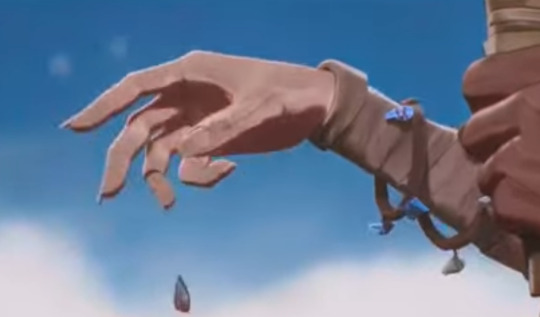
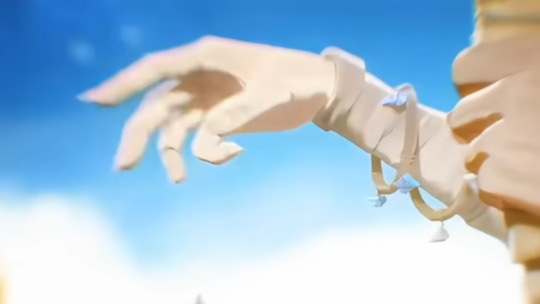
There's a few plausible theories one could roll with, though I don't think the show itself has one answer they planned. While I still fully think Arcane could have at least used another act to flesh out more details and give that breakneck ending some time to breathe, one thing I like is that they do give the audience a lot to work with in the details. Though I'm also someone who enjoys having lots of breadcrumbs to play with in a story,
(tangent, but as someone who loves different methods of storytelling this is why I love Arcane and how it uses narrative, visual, and musical storytelling methods to weave everything together. It's approach to crafting a story is also very collaborative, which is how we get different answers between writers and the animation teams (see the writers not intending Jayvik, but more and more animators/VA's revealing that they ship it, and YEAH, most of the Jayvik content is in their body language and vocal delivery. I think the audience is included in that collaboration, and they give the audience a lot to build pretty solid speculations with. Tho again....we could have used things slowing down to make it easier to take in at that end there.)
Also; introducing a multiverse is kind of genius when you have a story that has nebulous cosmic magic, since it creates a LOT of leeway for getting around details like Wizard Viktor. (Again, not a dig at all!)
One take I have is that Wizard Viktor never transformed into the Arcane Herald form because Jayce never killed him. For extra heartbreak, the pose we see Jayce in could have been a willing submission instead of defeat :). There is still some of the arcane corruption coloration around his face, with the rest of him being hidden besides the hands. That leaves the hexcore body still, but since our Viktor had his face exposed I don't see it as much of a stretch that Mage Viktor may not have had his entire body changed.
Another take, and I think the easiest answer, is that Mage Viktor is already at a level where he is fucking around with timelines and is seen using an anomaly and it's not much if any stretch to assume that he can change how he looks to some extent. The anomaly is a force of perpetual creation and self annihilation (aka exactly what he's doing by perpetually making himself/Jayce while trying to avert his own existence). I headcanon that his first attempts to undo what was done to Jayce (and everyone else but it's pretty obvious Jayce is his focus lbr) involved him trying to undo his own evolution and using the time shenanigan powers of the anomaly to make himself more human again.
97 notes
·
View notes
Text
as someone who has recently read the reckoning of roku, it’s really not the anti fire nation propaganda that a certain subsection of fandom is making it out to be. yes, gyatso says those words to roku, but he’s angry - at both the world and at himself for the death of his sister. he later apologizes to roku. the book does not paint gyatso out to be in the right, and neither does it paint all fire nation citizens to be in the wrong. the narrative even makes a distinction between the good fire nation citizens (ta min and roku) and prejudicial fire nation citizens (sozin, primarily), and some morally ambiguous ones like dalisay, but they’re more or less abolished from any accountability for partnering with sozin.
avatar the last airbender does not do a good job at displaying much of the context associated with the crimes of the fire nation, aka the climate and perspectives that justified sozin eradicating the air nomads and many of the benders in the southern water tribe. we know from avatar that sozin wanted to conquer the rest of the world for fire nation domination and expansion, but we’re not given much insight into the causal factors that allowed him to conduct genocide and colonialism, beyond “he was able to do it all in one day with the power of the comet,” and “he was a very bad man.”
the reckoning of roku provides the context for all of that, the factors that contributed to sozin’s blood-thirst. which means seeing sentiment from sozin that view the air nomads - and their pacifist ways of life - as inferior and below human. the novel doesn’t particularly attempt to humanize sozin, not in the way that other medias do when exploring the backstory of their villain. at the end, the takeaway from the novel is that sozin is on the road to becoming the ultimate fascist we all know him for, but this time we’re provided more context into how he became that fascist, and why roku hesitated to kill him.
is it more critical of the fire nation than most of the franchise? yes, i would say so, and having a filipino author be the one to offer that commentary is an excellent decision by avatar studios. but the extent of the critique is still more or less along the lines of “this one guy was truly the operations behind it,” which is still consistent with what we’ve seen in atla. there’s nothing too radical introduced in terms of colonial theory, unlike what parts of the fandom are saying.
which leads me to my final point: if this is how badly a subsection of fandom (aka fire nation worshippers and zutara shippers [not mutually exclusive]) are reacting to the simple notion exploring how sozin committed genocide, then they’ve hit further rock bottom than i can imagine. not only that, but this type of reactionary behaviour risks alienating other parts of the fandom; for instance, fans of the avatar novels who otherwise would have given the ship and the shippers grace.
in other words, many of these hardcore shippers “criticizing” the roku novel have no one to blame but themselves if their behaviour leads to the alienation of regular fans. this loud subsection of fandom is so caught up in their one-sided, imaginary fantasy where everything in the franchise somehow revolves around aang/kataang vs zuko/zutara, that the Evil Bryke are always targeting them, to the point that they’ll fail to realize that the fire nation and fire nation characters are often absolved from accountability across the IP, and the fire nation is explored much more than the other nations are.
#some of yall had me perceive the roku novel as this ultimate commentary and critique of the fire nation#so imagine my disappointment when it wasn’t#still a good read though i recommend#And ribay is a great author#antizutara#reckoning of roku
97 notes
·
View notes
Note
how much do you think chuck was actually affecting the movement of the plot throughout the series?
personally, i think he was just observing them from season 6 to season 10, but then he actually had to get involved upon amara’s return. and i do like the theory that he was responsible for the “vision” that cas thought he saw from jack, and that he kinda let mary get killed after cas’s prayer in 14x17, before again becoming fully involved throughout season 15. but for the other seasons 1-5, most of 12-14, and really for the overall universe, idk how much can, or should, be ascribed to chuck’s machinations. like i can never decide which route would be most satisfying for me as a viewer, and so i’m just curious as to what your opinion might be :)
Jack visions theory
Probably helps just to say starting off for anyone who might be coming from a different perspective, that my own understanding of Chuck's machinations in Supernatural (at least when it comes to Sam, Dean, and Cas) do not involve directly violating their free will. Chuck's machinations involve shaping the experiences around our characters to convince them to make the choices Chuck wants them to make. For example, when Dean tosses the gun aside in 14.20 and refuses to kill Jack, Chuck shouts "Do it!" instead of putting some kind of mind whammy on Dean that makes him kill Jack because Chuck either can't do that or won't do it because it wouldn't get him off. Chuck needs Dean to do what Chuck wants him to do (kill Jack) because Dean was brought to a point psychologically where he chose it. The same thing is true of Sam in season 4. The demons or the angels or Chuck don't operate Sam like a robot—they slowly convince him to take one turn after another based on the psychological state he's in, the things happening around him, and the things being whispered in his ears until he's killing Lilith and Lucifer's cage is opening, and Ruby says,
No. It wasn't the blood. It was you... and your choices. I just gave you the options, and you chose the right path every time. You didn't need the feather to fly, you had it in you the whole time, Dumbo! I know it's hard to see it now... but this is a miracle. So long coming. Everything Azazel did, and Lilith did. Just to get you here. And you were the only one who could do it.
I refer to Chuck's influence on the narrative as causality rather than fate. I have a tag for this called #spn and causality. 4.18 goes to great lengths to show how difficult it can be to subvert causality. For example, Dean tries to defy the writing by moving himself and Sam to a different hotel than Chuck wrote them to be in, but the motel's neon sign goes out, causing the name of their motel to "change" to "The Red Motel"—the motel Chuck wrote. ("No matter what details you alter, we will always end up here" etc etc). However, this episode goes on to show that it is possible to leap out of causality's flow. Chuck's control of the narrative ultimately works via anticipation. If he can anticipate his creations choices, his writing realigns everything with the narrative. If they do something he is unable to anticipate? They can leap out of his narrative just long enough to make a difference.
How do they leap out of causality's flow? Two things together: Dean and Cas. Quoting myself here in this post:
Leaping out of causality is something Dean and Cas do together in 4.18, 4.22, and 5.22. In 4.18, Dean pleads with Cas to help him save Sam, even though Cas thinks what’s going to happen is fate and can’t be subverted. Cas doesn’t personally act, but he gives Dean the idea that Dean then executes, leading Chuck to say “What are you doing here? I didn’t write this.” In 4.22, Dean pleads with Cas again. They again fight about the inescapability of destiny. This time, it’s Dean’s pleading but Cas’s actions—flying Dean out of the green room (somewhere Dean is incapable of escaping from on his own). Chuck says when they pop into his house, “Wait. T-t-this isn’t supposed to happen” and then “Yeah, but you guys aren’t supposed to be there. You’re not in this story”. In 5.22, after Lucifer takes Sam over (something that was foretold to happen in Detroit), Cas and Bobby despair, but Dean refuses to give up and calls Chuck, who says, “Oh, uh, Dean. Uh, wow. I, uh, I didn’t know that you’d call.” Then Dean goes to Stull Cemetery alone. However, the moment that Michael begins to walk up on Dean and says, “You little maggot. You are no longer a part of this story!” Guess who suddenly appears with a holy oil Molotov cocktail?
Dean and Cas are something Chuck seems to have a lot of trouble anticipating. I think this is true both individually and as a unit. Individually, Dean is the narrative heart, to an extent that his capacity for love is always exceeding the bounds that Chuck anticipates, leading to confounding leaps like showing up at Stull in "Swan Song" and dropping the gun in "Moriah" and saving the world with the power of love in 11.23. Dean in turn pleads with Cas with that heart, and Cas is angel with a crack in his chassis straight of the line. Naomi/Chuck cannot get Cas to do what he's "supposed" to do no matter how many times he's reprogrammed. He has Loving Dean Winchester/Humanity (same thing) Disease and it's incurable no matter how many lobotomies are attempted.
In the season 1-5 setting, Chuck is actually fairly hands off despite all of this being his prophecy foretold. He told the archangels that everything would end with Sam and Dean as the vessels for Lucifer and Michael (5.08) and Lucifer passed these stories on to his princes, and the angels and demons brought that prophecy to fruition—including with deliberate meddling in the Winchester/Campbell bloodline (5.13, 5.14). Heaven and hell act as Chuck's hands and feet, carrying out his plan out of desire and (in some cases) religious fanaticism. Because Chuck's so painstakingly worked on this narrative and everything is set up in advance, he can just watch it play out. When he interferes directly, it's actually to give Team Free Will a better shot at subverting him. Chuck only directly interferes in
4.22/5.01 to transport Sam and Dean to the plane, un-demon blood Sam, and resurrect Cas
5.22 to resurrect Cas again
All that said, I think season 1-5 is the original Chuck canon, which is subverted by Team Free Will working together, and most specifically, by Dean and Cas interfering in ways Chuck did not anticipate. And Chuck was fine with this. His narration at the end of "Swan Song" reveals that he's pleased, even if the story turned in a direction he didn't anticipate (maybe the Michael and Lucifer story started to bore him—they bore me, and him wanting Sam and Dean to mirror them so rigidly was rather uninspired).
I get the sense that Cas is probably a good litmus test for whether Chuck's entertained or not by the story subverting his expectations, because Cas is not "supposed" to be a part of the original story, but Chuck keeps bringing him back anyway. And yet, somewhere down the road, Cas falls wildly out of favor with Chuck, and Chuck is hurling rage at him for never doing as told—the very thing he seemed to like about Cas at first.
Maybe I'll see things that will make me change my mind as I work through seasons 7-10, but so far, I agree with you that season 6-10 seems to be a mostly "hands off" period, with Chuck only arguably interfering once, to bring Cas back a third time in season 7, depending on how seriously/literally you take Daphne's recollection of events in 7.17:
EMMANUEL/CASTIEL A few months ago, she was hiking by the river, and I wandered into her path, drenched and confused, and... unclothed. I had no memory. She said... God wanted her to find me.
It's not necessarily clear exactly where Chuck loses interest (or if for example, Cas might fall out of favor with Chuck before Sam and Dean do). Chuck shows up in season 10's "Fan Fiction" to see a play of his work, so he was clearly feeling fond enough to celebrate his handiwork in an very non-prestigious but intimate setting. But when Chuck shows up in season 11's "Don't Call Me Shurley", he talks to Metatron about traveling (to his other universes, perhaps?). Chuck's writing his memoir, and Metatron claims it's full of self-doubt and nebbishness. Chuck's apathy jumps out to Metraton quick too. Metatron criticizes Chuck for writing only two paragraphs on the archangels in his memoir, lending to the notion that Chuck had come to a point where they bored him. Metraton tries to remind him that Lucifer was his favorite because he rebelled, but Chuck then denies that Lucifer was ever even his favorite! He doesn't like this rebellion thing so much anymore... which might also tip his hand as far as how he's beginning to feel about Team Free Will. I think it's likely that Amara is the catalyst for his change of heart, but I'll have to wait until I circle back to season 11 to have a fully formed conclusion on this.
Then we get seasons 12-15 where—at least arguably—Chuck begins planting the seeds for a new final ending, trying to force Dean into the role of Michael—the son so loyal to him that he killed his own brother. The problem is that Dean's never really been like Michael, and that's the whole reason season 5 never worked. It's also the reason "Moriah" doesn't work. Lilith claims in season 15 that Chuck has a creepy obsession with Dean—Dean specifically. Dean whose loyal love fills Lucifer with such seething jealousy in "Swan Song" that he loses control of Sam's body just as Dean's pleading brings Sam's consciousness to the surface to fight. That same loving heart thaws Amara toward Chuck in 11.23, and I think Chuck... decides that he does not like this. It is something beyond his capacity to express or to anticipate and write around. It is transformative, causality-defying love, that ruined his original ending (and he's BORED and TIRED). And has given Cas Winchester Derangement Syndrome so he can't be controlled. He decides that he hates Dean Winchester's heart, and he tries to obliterate it out of existence and force Dean into the Michael role once and for all.
#mail#spn and causality#chuck#11.20#5.22#11.23#14.20#10.05#7.17#4.22#5.01#4.18#multiseason#dean the narrative heart
46 notes
·
View notes
Text
A Look into My Witness/ Destiny Cultural Project!
Greetings!! In order to help organize my cultural project (that I am still working on, so everything here is still malleable as my understandings and drafts change!), I decided to share with you guys what I aim to tackle (warning, I’m not a professional by any means)!
My project is a very causal one that will be used to form discussions with others. My goal is to encourage people of my culture to tell passionate and authentic stories after years of pressure to be docile to Western ideals, using the Witness and its role in Destiny to show that there are universal themes and antagonists we can portray to a worldwide audience!
I’ve been hopping around getting interpretations about Destiny in order to understand how others perceive a story that can be read to resonate deeply with our experiences.
For context, I am using this reading, inspired by my cultural experiences, to compare interpretations against and form this project: the greater story of Destiny is about how the indifference of the universe and its tendency to act in ways people see as cruel paired with the questions left by its silence drive people to seek an answer to it that is objective/perfect out of fear and pain, failing to realize that there is no one way to look at those aspects of the universe spiritually and that the pursuit of enforcing purpose leads to cutting away at beliefs/people that you deem a threat to your paradigm.
That fear of uncertainty and the inability to make the universe act the way you wish it would often leads to individuals forfeiting a personal existential pursuit in favor of assurance within a collective belief system that gives them a sense of safe, objective meaning; a system that can cause long lasting devastation, but can be defeated by choosing to fight alongside others to protect diversity and the right to self autonomy, even if that means living in a world that can cause pain alongside others that can choose to be immoral.
I relate this to an exploration of Caribbean culture against imperialism, specifically religious imperialism, and talk about beliefs/ideas like Myal, Obeah, Vodou, Evangelism, Fundamentalism, and Négritude.
Here’s what I have as categories!
A Silent Universe is One Open to Interpretation for All- Understanding the Traveler/Gardener’s role in Destiny’s narrative and how that leads into creating stories inspired by its dedication to free will as well as our own culture’s interpretations on the roles of the universe’s forces and divinity (with personal additions added from my experiences of focusing on scorning the universe instead of helping others understand their place in it as a partial result of people forcing the narrative of an omnipotent, omnipresent, all knowing God into fitting the white supremacist theory that slavery was earned via the lineage of African individuals to Ham from the Bible)
Don’t Submit to the Indifference of the Cosmos, Work in Spite of It- Understanding the Veil/Winnower’s role in the Destiny narrative and how that can enrich stories involving fighting against Social Darwinism and dogmatic cruelty (discussion of the hive occurs here)
Do You Need Salvation? I Don’t, but You Do- Understanding how the ideas that the Gardener and Winnower represent lead to the creation of the Witness and using that to sympathize and understand the behaviors of “Precursors” in our real world; an argument against the notion that ethics is only for “civilized westerners” and that religions with vertical morality/a “perfect”, blissful afterlife are the objective truth
We Don’t Want the Ends and We Sure as Hell Don’t Want the Means- An analysis on the intentions of the Precursors and how far intentions can be valued in stories that focus on the consequences
We Fight Systems, Not People- An exploration on how the decision to make the Witness it’s own being outside of the Precursors makes it a powerful representation of how individuals can harm themselves to make an oppressive system that is more than their individual actions
It is Beauty Amongst Ugliness- An exploration of how Destiny’s support of fighting for hope and personal freedom against insurmountable odds shows a potential interest from general audiences for Caribbean stories of maintaining hope in desolate conditions; a discussion on how tales of black triumph has a place on the world stage
You Look at the Sands, I Look Beyond the Horizon- A discussion about how more communal groups that are close to their cultural identity might focus on the more societal, large scale implications of a story rather than the more personal implications individually minded people see first, something to be aware of and acknowledge when creating cultural fiction (with observations about Witness interpretations and other pieces of media, like Dev Patel’s movie Monkey Man) (please note I am not demonizing any type of interpretation, I just think it’s important to consider that people have different scopes in order to avoid frustrations in story telling)
Disciples, Taken, Dread, and Zombies- An exploration of “zombification” (as used in the book Myal by Erna Brodber) to explain the treatment of the Witness’ forces and relate it to how imperialistic acts aim to strip people of cultural/religious identity to use for the perpetuation of its ideology
I Hope That’s Dread You’re Feeling - A discussion on how, after years of intimidation from oppressive powers, fiction can be used to cause negative reactions in audiences that move them to take our issues and stories seriously (with pieces of the Witness’ abuses, manipulations, and mutilations described); a discussion on the importance of fostering a Lordean Rage in depictions of abuses as well as the exploitation of black bodies (with additions from Myisha Cherry’s book The Case for Rage)
Leaving Lubrae Won’t Save You- An analysis of how Rhulk can be interpreted as a metaphor for zombification; how imperial powers seek to prey on the vulnerable and frustrated to isolate them, instill in them their ideology, and turn them on people who struggled just like them with promises of salvation (with additions from Derek Walcott’s Dream on Monkey Mountain play and the book The Wretched of the Earth by Frantz Fanon)
You Can Look at it This Way, or That Way, or That Way Too- An overview of some of the historical/mythological/cultural/philosophical/psychological references in Destiny that are key to understanding the world building and how Bungie uses them to enrich the game’s themes; a discussion on how we are not alone in our struggle to prove we have a right to existence and expression
You Should Always Aim to Do Better- A discussion of some of the narrative shortcomings in Destiny, especially involving racial biases (intentional or not), that storytellers should be mindful of when developing narratives or using cultures to inspire antagonistic forces
Is it Human? Male? Female? No, it’s Evil- A general discussion on the design of the Witness paired with more specific observations on how people interpret it’s gender; a detailing of personal observations on how whether the Witness is seen as masculine or feminine often coincides with what traits/interpretations of it are given attention, related to how imperialism is often seen as a masculine force
The Stars Were Made for Us Too- An encouragement to people of my culture to not shy away from implementing our experiences in sci-fi and fantasy settings based on some of the aspects people admire about Destiny (inclusion of varied forms of gender expression and sexualities, poc from different backgrounds being main characters, etc.) (with additions from a visual arts thesis a friend of mine is producing about black mythology and the novel Their Eyes Were Watching God by Zora Neale Hurston)
If you guys have any questions or want to participate, go to my pinned post and comment on it/Dm me personally! I’m still accepting responses to my questions and lore/references that could help me out, and I thank everyone who shared that post! Thank you for your time and I’m so excited to keep working on this to refine it more!
#destiny 2#destiny#destiny the game#d2#the witness#destiny witness#destiny the final shape#the final shape#oooooooo this is so scary to post I’m not joking#but!!! I’m being very brave!! and sharing my opinions!!!#the final shape and destiny in general changed my life and made me take pride in existing#im so excited for this project and speaking event#the witness and the traveler and the veil means the world to me#and their story made me break out of a mindset that kept me angry at an idea of the universe I didn’t have to have#im forever grateful for destiny’s story and I want to speak to others the way it did me#it certainly isn’t perfect and there’s so much I don’t like about it#but it changed everything and I think it could be of use to others#let me know if you have any aid you’d like to provide for this project and I want to thank everyone who has been a massive help#it’s been so nice talking to people from across the globe and with different backgrounds on this#as well as learning more about my own culture#the traveler destiny#the traveler#the veil destiny#the veil#rhulk#rhulk destiny#destiny hive#none of this is an attack or disregard for any of interpretation of Destiny btw#and no identities are given out for people who offer their takes#sorry if there are typos
13 notes
·
View notes
Text
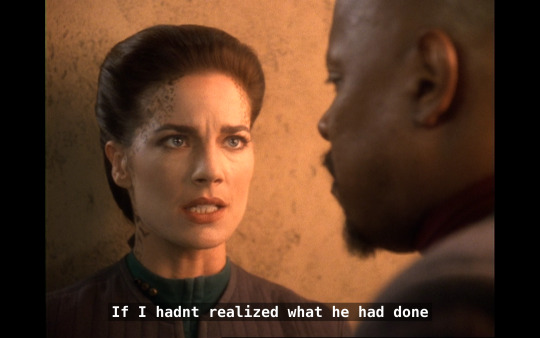
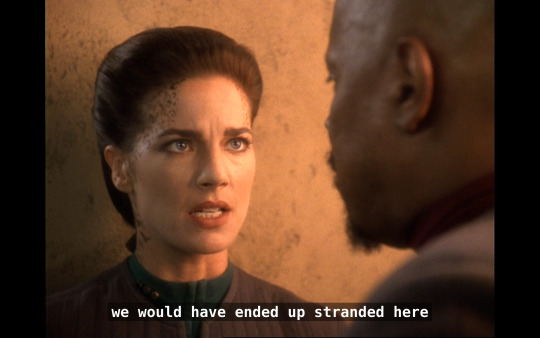
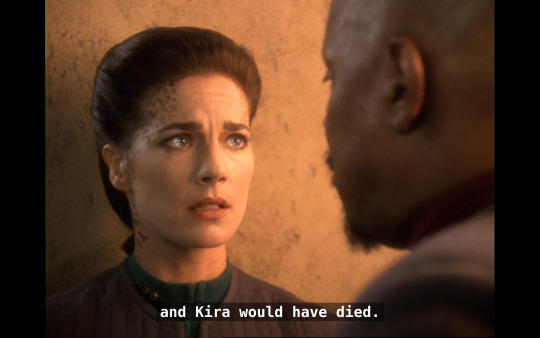
"if I hadn't realized what he had done"-- there are two very separate people in this sentence. the verb tenses are insane, too, because, like, kira is dead. but here jadzia is trying to blame yedrin for the second death-yet-to-come. making this the first time that jadzia has not claimed the shared-person of the symbiont as some form of self. maybe it's because yedrin is a future Self? but it doesn't ring true to how jadzia has acted about her various Persons before. in an almost mirror to the fake-doubling/separation that yedrin has "proposed" as a way for the crew to leave the planet while also staying, jadzia is not claiming yedrin's actions, even if he is technically jadzia (and curzon and joran and...) as well as himself. his decision to lie to them belongs, in some part, to her--it has to, since joined trill have never been shown to be able to truly distinguish their complex actions and decisions from one person to the other.
which means that jadzia is in this scene not just realizing she's responsible for kira's death (i mean, she's not) from the first time through the barrier but also responsible for kira's death again for this maneuver from yedrin (which, like, yes. she is within yedrin the whole episode. there are in fact two jadzias present).
with all time-traveling stories, there's a circular nature, since it's not like any of us are capable of imagining going faster than the speed of causality and escaping the single-direction-move along the temporal dimension of all 3D beings; which inevitably turns our time-travelling-stories into closed-circuit-deterministic-circular narratives or makes us lose our minds about butterfly theory. which is probably why the character who seems most comfortable with this whole situation is kira who's used to considering a future-already-written as just a law of reality. she references the prophets to odo and the others several times and you can't really argue that much with her because so far everything her gods have spoken has come true.
but jadzia i think is running up against determinism here not just from the situation itself (her future being told to her by her ancestors and the future dax host--her obvious discomfort with the idea of marrying worf according to their relationship in the present moment with the sort of flip side that is miles's discomfort with marrying someone who is not his wife in the present moment). in addition, i think she's struggling with the determinism associated with being joined. there's a weight to the fact that her person is not wholly controlled by her but cannot be separated from her. would jadzia choose to let kira die? no, not at first. but then she does because that's what kira wants--and everyone else sort of agrees. would jadzia lie in this way yedrin does to get her way? would jadzia "save" the lives of 8000 at the sacrifice of one? would jadzia betray her own self? would jadzia take a very difficult decision out of the hands of a past life, another self? she can't answer that question now, but also she can--because a future self does all of that, a future self that cannot be separated from her.
before this episode, obligations to the past-lives of the symbiont seemed to come easy to jadzia. well, not easy, but she doesn't spend a lot of time struggling with accepting them and carrying their burdens. here, she realizes she will be a burden for yedrin. so, on top of everything she thinks she's to blame for, she also now has to confront yedrin's existence, who carries kira's death as jadzia would. all of this seems exactly the kind of thing that jadzia, who will happily deal with the consequences of her past lives' crimes or the personal heartbreak of her own decisions, is not prepared for. she has not yet been in a situation where someone else has to carry her.
#jesus louiseus this episode!#jadzia dax#ds9#star trek#still got a lot of kiradax thoughts yet to be written because of course i do
83 notes
·
View notes
Text
About that time travel shenanigans...
Regarding upcoming chapters, I have a bit of a prediction...
I have a theory about why ONE sent Saitama home instead of making him go with Blast to confront Empty void. Not just because he wants to build up empty void as a villain, character and Blast's partner and Saitama could just wipe that prematurely by dunking on void.
It's because of Empty void's ability to genjutsu people that easily and abuse that emotional dependency is like holding a loaded Chekov's gun on Saitama's forehead.
Chekhov's Gun is a narrative principle where an element introduced into a story first seems unimportant but will later take on great significance.
If Saitama joins the fight, he can either just make Empty void useless and laughing stock because he can cheese it in a classic Saitama way, being immune to everything void does and sure, it would probably be funny OR…Empty void can trauma dump on Saitama, trigger a ptsd and make HIM useless in a fight. It would also serve to make Empty void an actually threathening villain and elevate his status and the stakes because Saitama is suddenly completely unable to handle him like he handles the rest, despite being on the scene.
Genos said Saitama essentially manipulated the laws of causality with his time travel and Empty void is casually doing the same thing and it's kind of insane how it's not a bigger deal. Empty void can jump from branching universe to another and affect them on a whim.

Saitama cannot be defeated perhaps, but he's gotten disabled from the fight before, like during Garou battle. And then maybe Saitama won't remember anything at all after the Genjutsu is over because of trauma amnesia, he'd just be very visibly disturbed and suddenly the joke about having time travel trauma amnesia is no longer funny in a classic ONE fashion.
ONE never forgets. Intermission chapter with Suiryu was just to give him and Murata-sensei time to cook after doing those rewrites cuz ONE wants to do this arc right. And 2 months is a long time to cook.


Urgent you say? You don't know what you're asking for Sitch. Resolved? How preposterous indeed. It's not resolved unless Saitama is able to remember the entire thing.
ONE: Funny amnesia haha Also ONE: Here's my thesis on what happens when people have ptsd and it gets triggered.
14 notes
·
View notes
Text
Because stories are important.
People think that stories are shaped by people. In fact, it's the other way around.
Stories exist independently of their players. If you know that, the knowledge is power.
Stories, great flapping ribbons of shaped space-time, have been blowing and uncoiling around the universe since the beginning of time. And they have evolved. The weakest have died and the strongest have survived and they have grown fat on the retelling...stories, twisting and blowing through the darkness.
And their very existence overlays a faint but insistent pattern on the chaos that is history. Stories etch grooves deep enough for people to follow in the same way that water follows certain paths down a mountainside. And every time fresh actors tread the path of the story, the groove runs deeper.
This is called the theory of narrative causality and it means that a story, once started, takes a shape. It picks up all the vibrations of all the other workings of that story that have ever been.
This is why history keeps on repeating all the time.
So a thousand heroes have stolen fire from the gods. A thousand wolves have eaten grandmother, a thousand princesses have been kissed. A million unknowing actors have moved, unknowing, through the pathways of story.
It is now impossible for the third and youngest son of any king, if he should embark on a quest which has so far claimed his older brothers, not to succeed.
Stories don't care who takes part in them. All that matters is that the story gets told, that the story repeats. Or, if you prefer to think of it like this; stories are a parasitical life form, warping lives in the service only of the story itself.
- Terry Pratchett, Witches Abroad
18 notes
·
View notes
Text
Two styles of narration dominate the field of history: progress and alteration. These are two ways of describing change. Progress narratives and alteration narratives are mutually exclusive. The first tells the story of the past as a movement, or “progress” toward some ultimate end. Alteration narratives do not analyze the arc of history as movement toward any destination. An “ideology of progress” (Chakrabarty 7) posits that humans and events move toward a teleological endpoint. Progress narratives are defined by their implicit or explicit assumption that history is a process of development. They are “stagist” (Chakrabarty 9) because their stories of history proceed in delineated stages. In this type of model, societies and/or Society grows in the same way that child becomes an adult. Humanity has a “Youth” and will have an “Old Age” (Nietzsche 30). The growth never ceases — every action, every accident, makes “the world… more complete” (Nietzsche 6). The world moves closer to “its end in every moment” (Nietzsche 6). That end is a moral, religious, or cultural completion. Progress narratives declare that all nations or cultures begin incomplete, and that they will — they must — become complete over time. History, in these models, is the journey toward the End. Progress narratives are as diverse as they are plentiful. Marxism posits that societies and/or the globe as a whole move toward the Communist state. Social Darwinianism directly compares historical changes to the evolutionary concept of fitness. Colonialist ideology is based on the assumption that societies undergo a process of “development and civilization” (Chakrabarty 8). One such colonial philosopher is Mill, who believed “[humans] were all headed for the same destination,” and that India had to become like Europe (Chakrabarty 8). Schiller describes the end as “a harmonious totality” (Nietzsche 24). Note that there is not a shared endpoint in all progress narratives. Nietzsche writes that the endpoint of a progress narrative could be “happiness, resignation, virtue or repentance” (6). Sometimes, two progress narratives directly contradict each other. Marx’s ideal endpoint is a secular, atheistic state; Mill’s colonialism is fundamentally religious. But they share their belief in a “shape” of history that bends in service of a great good. On the other hand, alteration narratives accept that human societies change, but do not assume that this change is a form of evolution. They do “not entail any necessary assumptions of teleology” (Chakrabarty 23). While it is true that societies are always “developing” (Chakrabarty 23), there is no universal endpoint toward which they must move. Alteration narratives do not only dispute that society must move toward this or that end. They dispute that society must move toward any ideal at all. The alteration from one organization of society to another is always “secular, empty, and homogenous,” according to Walter Benjamin (Chakrabarty 23).
You can read the rest on Substack:
23 notes
·
View notes
Text
Been on a Superman kick lately, mostly because I didn't watch that Superman & Lois show for years because of the Yikes factor back when Season One started but I was curious to tune in for the finale, wanted to see how they closed that story out.....and somehow that led me to finally reading some of the T*m T*ylor written Jon Kent stuff and am currently laughing my ass off so hard this man is so proud of himself for the most basic shit he's like look at me, I cracked the code, I figured out that the real power in superheroes lies in them not upholding traditional narratives *proceeds to uphold traditional narratives while using slightly different wording and saying nuh-uh that's not what I'm doing at all*
Buddy, I don't know how to tell you this but if you're still winding up in the exact same spot as "traditional/older superhero comics" at the end of the story it doesn't matter how many times your story says "we have to figure out how to do things differently" like no shit. But did you reach any other conclusions? Did you actually do anything differently? Is Lex Luthor still doing the exact same things at the end of your story as he is at the start? Congrats, you perpetuated the cycle while saying I've done it! I've figured it out! We have to break the cycle!
......like. C'mon now.
It reminds me of that thing Hickman does that drives me up the WALL with his time travel stories. He basically just has characters come back from the future and change things all willy-nilly and then a present day character is like "wait but won't that create a paradox" and then his future time-traveling characters laugh condescendingly and go OH HO, you hapless primitive, you're so dumb, that's not how time travel works at all.
OKAY SO HOW DOES IT WORK AND WHY DOES THAT NOT CREATE A PARADOX THEN?
Obviously I don't need you to create an entirely new theory of handwaved comic book style temporal mechanics or what the fuck ever, but at least make an ATTEMPT to contrive some manner of internally consistent narrative logic that says this is why the story we're doing THIS way doesn't follow the same trains of thought advanced by previous stories you might have read about this topic.
The smug little asshole approach to "I'm not only not even going to address the questions of logic and causality inherent in my premise, I'm just going to laugh at the very idea they NEED to be addressed and act like my story is above having to entertain notions of "making sense" and whatnot" is like. Condescending as hell and it does not actually make a story better. It just makes the author look like a prat.
Also, prat is a very good, underutilized word. I shall use it more often. It sounds as ridiculous as you think a person is when you decide to call them a prat. I like that. Its very efficient.
#T*m T*ylor and H*ckman you are legendary PRATS and thats what I think about that#and yes I took the smug little asshole approach to writing this post but thats DIFFERENT see#Im doing it IRONICALLY#or maybe Im not but hey look the point is Im not getting paid to be a smug little asshole so like. Im not in this picture. obviously
6 notes
·
View notes
Text
things I would like to know about fellow writers
thanks for the tag @tellmeallaboutit
Last book I read: I've read so few published books lately but the last thing I read cover to cover and enjoyed thoroughly was Academic Exercises by K.J. Parker (a collection of fantasy short stories).
Greatest literary inspiration: Terry Pratchett, Ursula K. Le Guin, Tanith Lee, Kazuo Ishiguro, David Mitchell, Ted Chiang
Things in my current fandom I want to read but I don't want to write: Rugan/Gale/Tav set in Heart: The City Beneath AU (stares at @littleplasticrat with big eyes)
Things in my current fandoms I want to write but I think nobody would be interested in them but me:
Tav as a Chosen of Jergal who cannot meaningfully die until their quest is completed (as a bonus: Came Back Wrong).
Oathbreaker Knight/Paladin!Tav. Possibly an oathbroken Paladin of Eilistraee (Oath of the Ancients). How do you fuck an eldritch concept? I guess we're going to find out. (Psst, Bloodborne fandom knows how.)
I just really enjoy exploring the fallout of the awfulness of Tav's quest even in my smut whoops.
You can recognise my writing by: Extremely Sweaty Feelings, where I place my commas incorrectly (but I am trying to follow Proper Grammar Rules more now that I beta for others!)
My most controversial take (current fandom): Handwaving problems with Magic often removes stakes in story and combat. I'm more interested in less glamourous, low-magic story settings. Approaching it from a "high tech/low life" angle is also cool. I guess that's why the NPCs and factions like the Zhentarim appeal to me.
This probably isn't controversial, but I hate how people need to self-censor and deliberately untag themselves if they want to voice an opinion on their own blog about any of the Origin companions, especially Astarion. That's why I don't even interact with that part of BG3 fandom and I'm not interested in writing for it.
Top three favourite tropes: Enemies to Lovers, "One Flesh, One End", Theory of Narrative Causality (Once Upon a Time)
What’s your current writing mood (10 – super motivated and churning out words like crazy, 0 – in a complete rut): Two
Share a random frustration: I want to write a longfic that hits a 5 act structure. I am deeply terrified of abandoning it halfway. I know that most of the fear is simply because haven't written one successfully before, but I have no idea how it can be done. No one is forcing me to write this; I have 2k worth of notes and outline staring at me right now.
no-pressure tagging @omgkalyppso @say-lene @orlesianapologist
19 notes
·
View notes
Text
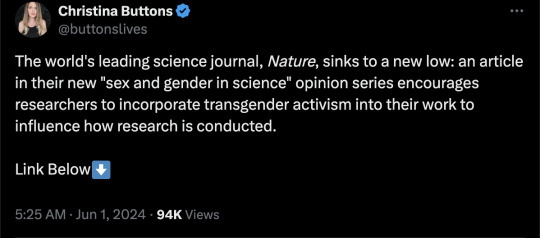
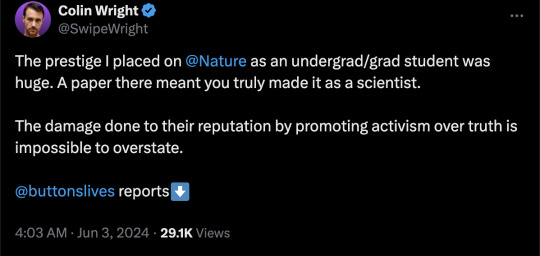
By: Christina Buttons
Published: May 31, 2024
The prominent science journal Nature has launched a new opinion article series on sex and gender. One paper in this series explores research attempting to search for a biological basis for trans-identity, arguing that such research could “pathologize” and “harm” the trans community. The authors discourage “investigations into the underlying bases of transgender identity” and propose various steps for researchers to incorporate transgender activism into their work to influence research outcomes — signaling the end of Nature’s commitment to pursuing scientific truth over ideology.
The article starts by reviewing neuroscientific studies aimed at finding the cause of trans-identity in the brain, identifying 83 papers from 1991-2024. It highlights the transgender brain-sex hypothesis, which suggests that trans-identified people have brain regions resembling those of the opposite sex. However, it neglects to mention that this hypothesis falls apart because the studies did not control for confounding variables such as sexual orientation.
The article does acknowledge that “the results of these analyses have been inconsistent.” Yet, when the media covers these studies, the public is often informed by headlines such as “transgender people are born that way,” “science proves trans people aren’t making it up,” and “attacks on trans people are also attacks on science itself.” You can read a simplified explainer I wrote debunking the brain-sex studies here.
The authors move on to the more plausible “own-body perception” theory, which proposes that reduced structural and functional connectivity between certain brain networks is responsible for gender dysphoria. However, these studies do not show a causal link, only an association. Abnormalities in body perception networks in the brain are also associated with many other conditions, including body dysmorphic disorder, anorexia, body integrity identity disorder, schizophrenia, and autism.
After reviewing the neuroscientific studies, the article’s language shifts into typical activist rhetoric, claiming that research into transgender identity can be “harmful.” The authors argue that if brain scans or some other objective test could assess whether someone is experiencing gender dysphoria, it could be used to prevent people from accessing cross-sex hormones and surgeries if they are not deemed “eligible.”
"A second possibility is that neuroscientific findings related to transgender identity will fuel transphobic narratives," the authors write, citing a “feminist perspective” social science journal article on "Transprejudice."
For example, they state, "Some people argue that allowing transgender women to access infrastructure, such as public toilets or women’s prisons, threatens the safety of 'real women'." It is odd and audacious for a serious science publication to use "real women" in quotations. Moreover, their source for this claim is an article about Kathleen Stock, who does not argue that transgender women threaten the safety of biological women. In fact, she explicitly states the opposite: "I am definitely not saying that trans women are particularly dangerous – they are definitely not."
The authors also take a dig at sexologist Ray Blanchard, claiming that autogynephilia “hasn’t held up to scientific scrutiny,” citing a "feminist analysis" paper by a trans activist. Apparently, they haven't spent any time on trans Reddit, where they would encounter a vast discourse on "gender euphoria boners."


The authors end by setting “four actions” for researchers studying transgender people to prevent further “harm” from being done. They suggest researchers set up an advisory board and multidisciplinary teams consisting of transgender people to consult on their study designs and “prevent the outcomes of neuroscientific and other studies from being described and published in an overly deterministic and simplistic way.” They also dictate what should and should not be studied, suggesting researchers "prioritize research that is likely to improve people’s lives" rather than searching for the cause of trans-identity.
The final suggestion is to “rethink how ethical approval is obtained,” which relates to an example they provided of a 2021 UCLA study that was suspended after significant backlash from transgender activists. The study aimed to examine the brains of trans-identified individuals by showing them images of themselves wearing tight clothes, intending to trigger gender dysphoria. Although the study obtained ethical approval from their research institute and the transgender participants provided informed consent, it seems they weren't the right transgender people to ask permission from. Their suggestion implies that researchers must obtain approval for their studies from transgender activists.
The authors seem aware of the implications of their recommendations, as they conclude their article by admitting their approach would limit scientific inquiry:
“Our aim is not to halt scientific enquiry. But when it comes to transgender identity, knowledge cannot be pursued in isolation from the many societal factors that shape how that knowledge is received and acted on.”
This statement translates to prioritizing activism over truth-seeking when the findings might be inconvenient or misaligned with political narratives and activist goals. Such a stance compromises the integrity and credibility of science, reducing it to a tool for activism rather than a means of uncovering and understanding reality.
It is disheartening to watch one of the world’s most prestigious scientific journals compromise their credibility by continuing to prioritize ideology over truth.
Besides, the authors' concerns about discovering a biological cause for trans-identity are misplaced. While there are biological traits associated with being transgender, such as same-sex attraction and gender nonconformity, “transgender” itself does not appear to be an inherent condition one can be born with. The concept of "transgender," as understood in Western cultures, is a cultural construct that doesn't have a direct equivalent in many non-Western societies.
Research into a cause for gender dysphoria would be difficult because the transgender population has become so heterogeneous. Even if one were predisposed to a psychiatric condition like gender dysphoria, predispositions are not predeterminations of a transgender outcome. The notion of transgender identities being fixed at birth is further contested by the increasing number of detransitioners and extensive research on desistance among children, suggesting that such identities can often be temporary coping mechanisms for young people in distress.
==
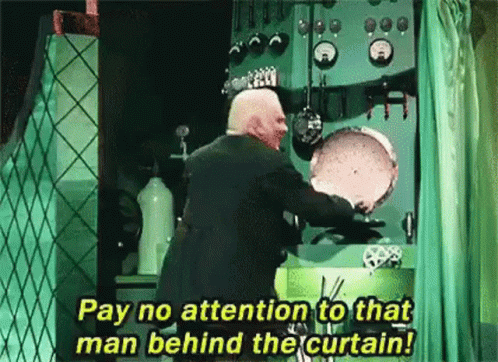
We're just supposed to accept that hacking off body parts and giving life-altering drugs and hormones is a completely normal part of life. And that wondering where this is all coming from, what's underlying it is the problematic part.
At its core, the point of this ideology is to pathologize the completely normal and normalize the pathological.
Carl Sagan warned us about this:
"The truth may be puzzling. It may take some work to grapple with. It may be counterintuitive. It may contradict deeply held prejudices. It may not be consonant with what we desperately want to be true. But our preferences do not determine what's true." ― Carl Sagan
Reality is not obliged to conform to people's wishes or preferences, and we are not obligated to lie or consign ourselves to ignorance in order to placate those wishes and preferences. We don't allow "if you find out what's true, it'll hurt our feelings" - i.e. blasphemy - for the religious. Why are we allowing genderist fanatics to get away with it, when it's still just an accusation of blasphemy?
When people say, "you're not allowed to go looking over here, it's a moral failing to do so," the correct response is to go, "now I want to go look over there even more."
-
"Sex is real... But the belief that we have a moral duty to accept reality just because it is real is, I think, a fine definition of nihilism." ― Andrea Long Chu, gender cultist and lunatic
“The facts may tell you one thing. But, God is not limited by the facts. Choose faith in spite of the facts.” ― Joel Osteen, religious nutcase and lunatic
#Christina Buttons#Nature#Nature magazine#ideological corruption#science denial#blasphemy#corruption of science#scientific inquiry#gender ideology#gender identity ideology#queer theory#intersectional feminism#religion is a mental illness
14 notes
·
View notes
Text
Debunking r/DIDcringe "debunking" Endogenic Claims
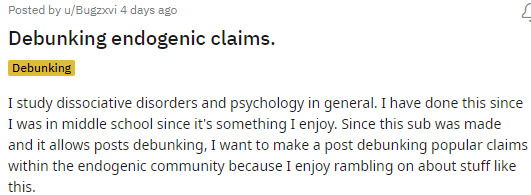
Cool!
I expect a well thought-out post citing lots of sources to prove their points!

No. There are many studies showing DID is heavily correlated with severe and repeated childhood trauma.
It's theorized this correlation is because DID is caused by trauma, but this hasn't been shown. A causal relationship, even if likely, is difficult to establish as it would technically require children to be traumatized to test.
Luckily, this particular nuance isn't actually a point of debate. Nobody on either side is arguing that DID can't be caused by trauma. I think most people on both sides are in agreement that the relationship is a causal one. (Even if I'm going to be pedantic about how that hasn't been proven.)
But just because a causal relationship may exist doesn't mean that's the only possible cause. To think this risks falling prey to the Fallacy of the Single Cause or Causal Oversimplification.
If you were to run an experiment where you hit people on the arm with a hammer, you can successfully prove being hit with a hammer is a cause of broken bones. But it would be fallacious to conclude that hammers are the only possible cause of broken bones.
Whether you can have DID without trauma is an extremely complex question and theories very often fall prey to the above fallacy.
I will say my personally feelings are that DID is virtually always caused by trauma, but people should be open to the potential for other causes to exist in rare cases.

I wouldn't use the word "prove". What I will say is that multiple experts in the field have acknowledged the existence or at least the possibility of plurality/multiplicity without trauma or a disorder.
It is true that there was one paper that suggested a continuum of multiplicity that ranged from what it called" identity disturbance" to dissociative identity disorder. Although it's worth noting that this same paper referred to DID as a severe form of identity disturbance and places them on a continuum together.
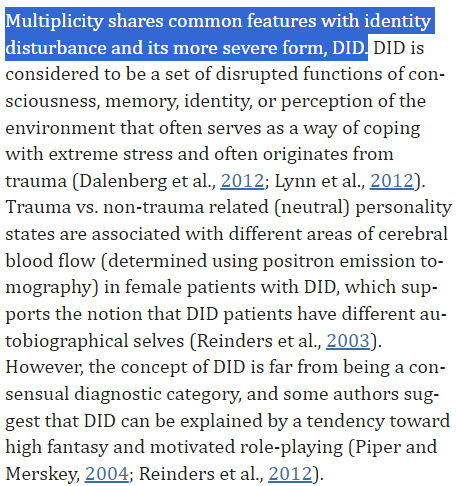
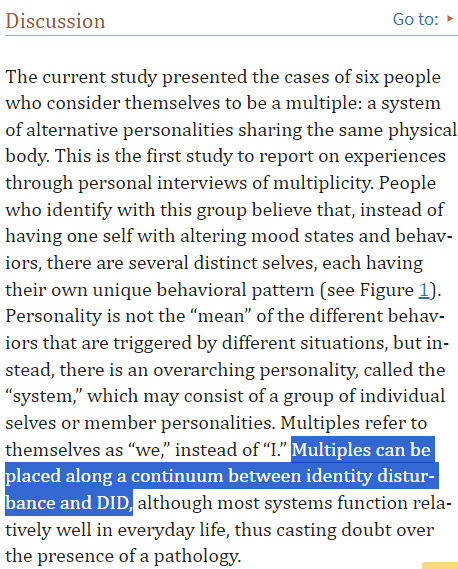
And the claim here that other sources are unreliable is just absurd.
Non-disordered plurality has been acknowledged in the World Health Organization's ICD-11's Boundary with Normality, stating that multiple "distinct identity states" may be present without a disorder.
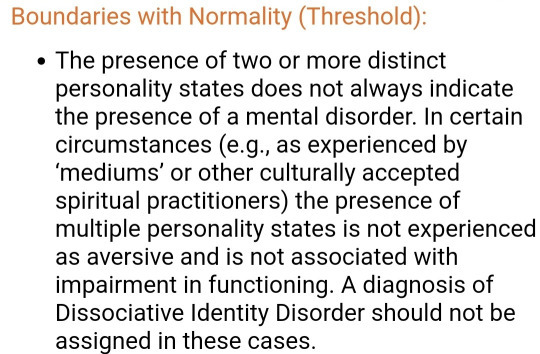
Likewise, the creators of the Theory of Structural Dissociation have said it's possible hypnosis and mediumship may involve "dissociative parts of the personality" that possess "self-consciousness."
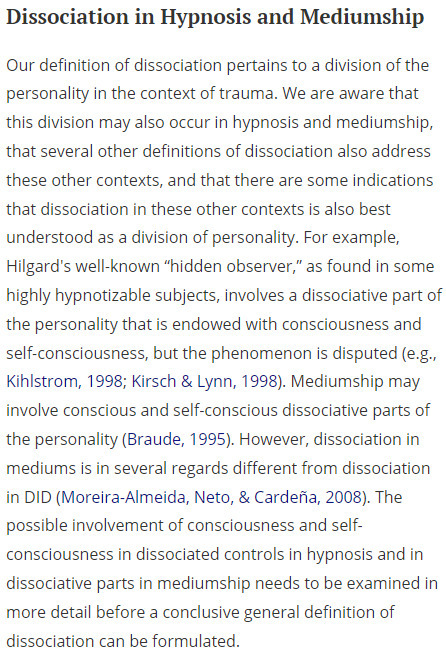
Additionally, the book Transgender Mental Health by Eric Yarbrough has explicitly said you can be plural without a disorder or trauma.
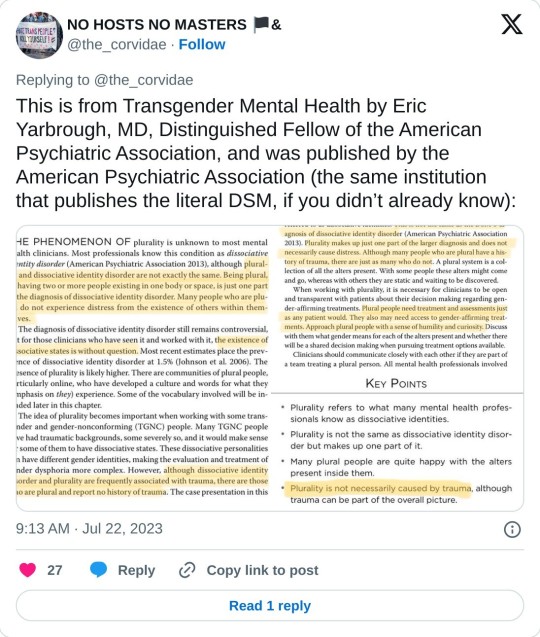
This book was reviewed and published by The American Psychiatric Association.
Notably, there is also no one saying the opposite. There is no academic paper arguing that you can't be plural without a disorder or trauma, or that you need trauma to have multiple "distinct personality states" or anything of the sort. If you look at academic papers, the range is from neutral (this needs to be studied more) to pro (this is a real phenomenon.)
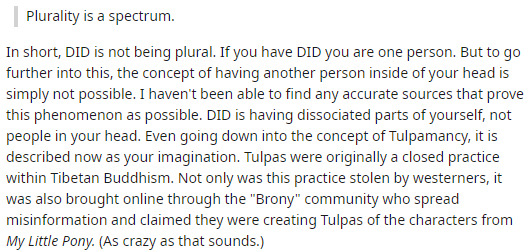
I'm not going to go too far into the appropriation claims beyond saying that Tibetan Buddhism is an open religion, the Dalai Lama has encouraged people of other faiths to use Tibetan Buddhist meditations, and there's no evidence sprul-pa (the practice tulpamancy was based on) was a closed practice.
The appropriation narrative was invented by and pushed by sysmeds, and isn't actually a concern within Buddhist communities. If you want to see this in action, here's a comparison of r/Systemscringe and r/Buddhism opinions on tulpamancy.
The fact that cringe subreddits are way more concerned about the so-called appropriation than actual Buddhist subreddits should be a good indication that this was always more about using Buddhists as a talking point to silence one of the most studied endogenic communities.
As for the whole "DID isn't plural" thing, this is just semantics.
Some DID systems view themselves as parts, others as people. Psychiatrists would say that the whole body makes the person. But there are philosophies that suggest that the ability for dissociated parts to each have their own self-consciousness and agency makes them a person.
When discussing plurality, I personally use the term "agent." It bypasses a lot of these silly semantic arguments over what is or isn't a person. Because whether we're talking about multiple people, dissociated parts, or even spirits, what we're discussing is an experience of multiple agents with their own self-consciousness and and agency.
That's essentially what plurality is.
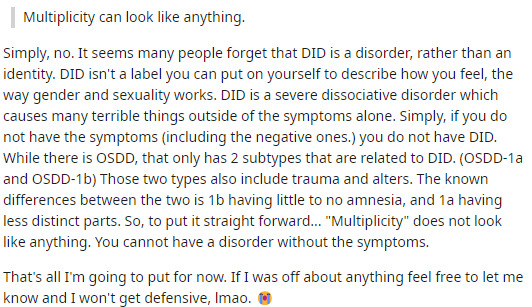
Multiplicity is an experience of being multiple. Again, the World Health Organization's ICD-11 says you can experiences multiple distinct personality states without a disorder. You do NOT need DID or OSDD to experience multiplicity.
If there's a single peer-reviewed academic source anywhere that claims you it's impossible to be plural without DID or OSDD, you're welcome to provide it.
Additionally, I've been unable to find any studies showing a significant correlation between OSDD-1 without amnesia (what's inaccurately called OSDD-1b) and trauma. It's often presumed to exist, but the evidence isn't there.
As you stated earlier, dissociative amnesia is heavily linked to trauma. If dissociative amnesia is a criteria of DID, then naturally that link would exist there as well. So then, if the multiplicity is caused by trauma, we would need to conduct studies into people with OSDD who have no amnesia to confirm that.
From what I've found, no study of this sort has been conducted.
Finally, this asserts that all multiplicity comes from these disorders. A claim that they fail to support in any way. Because they CAN'T support it.
Because again, all the research studying plurality have affirmed that you can be plural without a dissociative disorder.
Well, That Concludes Another Anti-Endo "Debunking" Post With No Sources!
Wait. That's not entirely true! They do link to this one:
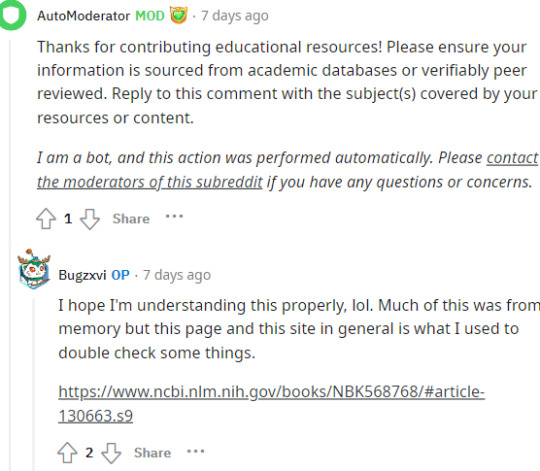
Except it doesn't confirm any of their points, and seems to mostly be added to prevent the automod from removing their post. Like they said, most of this was "from memory."
Meaning they're just regurgitating things they've heard online from unknown sources.
#actually a system#syscourse#multiplicity#sysblr#ableism#sanism#systems#psychiatry#pro endogenic#pro endo#r/systemscringe#systemscringe#reddit#didcringe#r/didcringe#hate group#hate groups
23 notes
·
View notes
Note
Salem said the Hound was "an experiment", but she never specified for what. Maybe it's her attempt at Ascension...?
the purpose of an experiment is to substantiate or refute a hypothesis, yeah? the hound exists in answer to a question. something salem didn’t know, but knew enough about to make what seems to have been a pretty good guess. she says she’s “pleased with the results [so far],” meaning the hound is evidently an at least partial success.
salem also spends quite a lot of V8 attempting to fill gaps in the information she has—throughout most of the volume her top priority is gaining access to the lamp’s knowledge. capturing the staff seems to be a secondary concern. thus, the hound belongs to a narrative arc which tilts on the fulcrum of questions salem wants answered.
so… what most interests me about the hound is the unknown hypothesis. what didn’t salem know? what was she trying to learn?
here’s some things to chew on:
#1: the audience knows something that disproves (or at least casts into serious doubt) ruby’s conclusion.
she thinks salem has been making hounds out of silver-eyed people for a decade or more, starting with summer. this cannot be true, because the hound is very new. salem isn’t experimenting ten+ years ago, she’s experimenting NOW.
#2: why now?
the nature of an experiment is that it begins with an idea of what might happen. that salem is doing this NOW isn’t, cannot be arbitrary—something gave her the idea. it is unlikely that “something” happened over a decade ago and she’s only just now getting around to it; salem is patient, but she does not waste time. doesn’t it make more sense to suppose that some recent event revealed a gap in her knowledge that she is now attempting to close? something like, oh, i don’t know—
#3: everybody knows that silver eyes only work on grimm…
…and cinder, that one time.
the question of why ruby’s first glare mutilated cinder is a textual mystery—in the sense that none of the heroic characters know the answer, and it’s inexplicable by the common in-universe theory of how this kind of magic works. the general assumption in the wider fandom is that the grimm beetle is to blame and salem knows it, but ruby hits cinder with a second fully-fledged glare at the end of V7 and cinder walks away completely unscathed. while grimmness may be a causal factor it seems not to be the only one.
we also don’t know exactly what happened in between the fall of beacon and cinder’s next appearance months at the top of V4—we don’t get to see how salem reacted, we only know the broad strokes of what information got reported back to her, and we don’t know anything about the circumstances surrounding the grimm arm being grown or grafted.
aside from a couple relevant details which i expect to be explored later (chiefly, to what extent cinder chose the arm) this is not information that we need to know—but i think it IS worth keeping in mind that we don’t know it, because it means we don’t know the extent of salem’s knowledge.
and that question—how much does salem know, and is her understanding accurate?—is key.
salem states that becoming the maiden is what made cinder vulnerable to the silver glare, and loosely implies that it’s a vulnerability cinder can defend. this is generally interpreted as a manipulative lie, but… we don’t know a lot about silver eyes, what we do know is mainly folklore, and cinder seems to be developing a resistance to the glare, which is a strong point of evidence in salem’s favor.
anyway, the point being: silver eyes are supposed to only work on grimm, but ruby’s glare maimed cinder. the lion’s share of salem’s screen time in V4-5 involves cinder’s recovery—salem provides an explanation, devotes months training cinder to achieve basic control over the grimm arm, and handles cinder’s feelings about the order to leave ruby alive. this is the focal point of salem’s character during this leg of the story.
then cinder falls from grace and salem is blindsided by the news that ozpin reincarnated way faster than anticipated, and… salem sort of recedes into the distant background of the narrative. we barely see her in V6. she’s not in V7 at all until the very end. we know she spends this time churning out an army, but That’s It—and then she turns up in atlas with the hound.
you see the dots i’m connecting here? salem’s path through the narrative goes like like: heavy involvement with cinder’s recovery after the glare and grimm arm -> months of radio silence -> kicks in the door with an experimental silver-eyed grimm in tow. why now? what gave her the idea? what hypothesis is she testing?
the explanation that makes the most sense to me is that salem doesn’t fully understand why the glare maimed cinder. i think she might know (or suspect) some things that give her a solid general sense of what happened and why, but she’s still in uncharted territory and she’s trying to figure it out. i think the things she tells cinder in V4-5 are theories—and the hound was meant to test those theories, evidently successfully.
which tracks with what we see play out in V6-7; maria’s silver eyes theory is inadequate to explain cinder, salem appears to be wrong about the maidens being vulnerable to the glare but broadly correct about cinder’s vulnerability being a consequence of something other than grimmness.
#4: death and resurrection
by this point it seems… pretty evident that silver eyes are connected to death in a more-than-symbolic way. there’s the flashbacks ruby experiences of pyrrha’s last words in V4. there’s the glare taking the hand cinder killed pyrrha with and the eye that didn’t get the maiden-eye-flames until she killed amber. and there’s ruby returning from her (symbolic) death being heralded by an explosion of white light, in contrast with the white-gold we see when the herbalist is reborn. and of course there’s the white void that people from remnant pass through when they die. and silver eyes themselves derive from ozma + resurrected humankind.
whether or not salem knows of ascension, i’m positive that she made this connection after the fall of beacon.
i think that’s probably why the question of whether cinder killed ozpin is a point of contention: cinder says she killed three people. the glare maimed her twice over, taking the parts of her that physically or spiritually touched two of her victims at the moment of death. if that isn’t coincidental, it leaves ozpin unaccounted for.
and i think that’s probably the line of reasoning salem followed to get to “it’s because of the maiden’s power.” she’s drawing a connection between the glare and the maiden power through the death required to inherit the magic. hence, also, the implicit association salem draws between “be patient about the maidens” and “be careful of ruby’s eyes” in V5.
so i figure that salem developed the hound to test that connection. its core is a silver-eyed faunus who should be very dead but isn’t. the… general assumption is that salem accomplished this by dipping the guy in a grimm pool, but… silver eyes are vanishingly rare! where did she find him! which is why i’m more inclined to think that he didn’t have them when salem found him, and part of the experiment involved turning his eyes silver, possibly by killing and reviving him.
(that or she straight up personified a grimm somehow. or borrowed one of summer’s eyes.)
98 notes
·
View notes